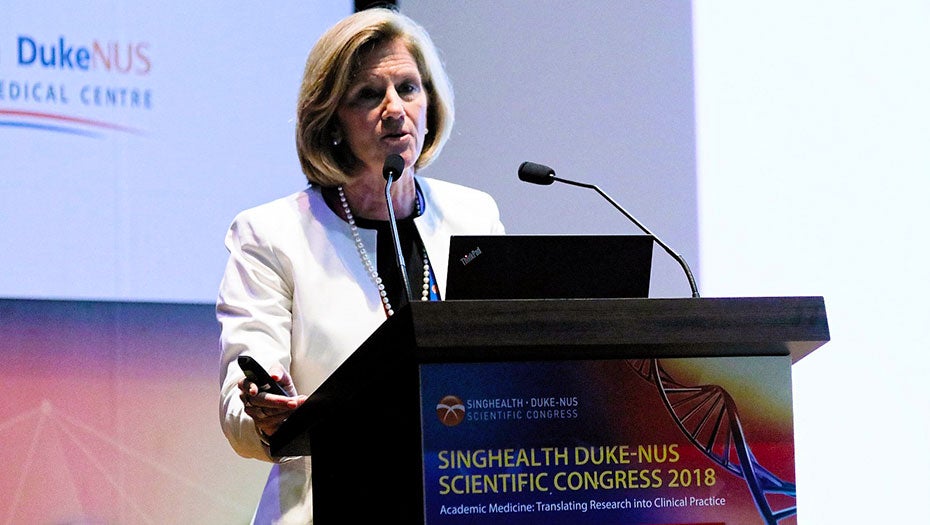
In an ideal world, education, research and clinical care converge to improve the health of our population. This is the noble goal of academic health systems.
However, we don't live in an ideal world, and striving to have an academic health system deliver care the way it is envisioned, comes with challenges, shared Prof Mary E. Klotman, Dean of Duke University School of Medicine, at the SingHealth Duke-NUS Scientific Congress 2018.
"Duke started out as a unique partnership between a medical school and a health system," Prof Klotman shared. "Over time, we have evolved and some of our evolution has not been advantageous, such as research being developed as a separate silo. We need to rethink clinical research and embed that in the daily care of patients."
What had to be emphasised was the concept of a shared purpose. Whether one is doing research or delivering care, both had the ultimate goal of improving the health of patients. Duke had to work towards streamlining regulations, pooling assets and infrastructure, and bringing together clinical service, clinical research and training around their care units, such as cancer, heart, surgery and women's health.
Mining Data Science
To Prof Klotman, one of the key commonalities underpinning the different disciplines is data science. A Health Data Science Centre at Duke connects a broad base of talent from engineering and computer science to data scientists and mathematicians, all converging to look at innovative, practical projects that improve healthcare.
One of the first projects was the Duke Connected Deep Care Management platform which takes care of about 50,000 financially at-risk patients. By consolidating billing and health information of patients, and examining the data, the project aimed to reduce unplanned admissions, which accounts for the largest component of costs. Using data science, Duke was able to capture the outcomes to better understand this patient population, and predict potential ways to intervene in their outcomes. Care managers are able to access real-time information to look after their patients.
What's the Big Idea
The faculty is a great source of ideas, and leveraging these ideas is the key to innovation. The Duke Institute for Health Innovation was started five years ago, to encourage faculty to come forward with new ideas and solutions. To date, more than 250 faculty proposals have surfaced. Some have received funding while others have been presented to investors and commercialised.
An example of a successfully commercialised project was on an early warning system to prevent sepsis within a hospital. There are over 750,000 cases of sepsis annually in the US, with high morbidity and mortality rates. Sepsis usually has no clear time of onset and is hard to predict. A data science project was launched, analysing some 43,000 patients over 18 months. After cleaning up the data, it was discovered that there is a significant window of time between when the risk model starts predicting sepsis and when sepsis is full blown clinically. If intervention is carried out early within that window, there is a good chance of preventing sepsis.
Re-learning Learning
"In an academic health centre, we need to engage the workforce in a way that is completely aligned," explained Prof Klotman. "We have not trained pharmacists to work with doctors, for example. We think it happens naturally but often, it doesn't."
Duke is developing training programmes that include professionals across the spectrum side by side. A new inter-professional programme called the Pilot Acute Care Clinic Degree brings physical therapy students, nurses and medical students together with faculty, and evolve around patients that need urgent care. In this way, the students learn how to complement each other.
At different levels, leadership programmes are made available to those who aspire to take on leadership roles. For example, residents can apply for a management and leadership pathway that would allow them to assume leadership jobs in the health system right out of training.
"Our health system is a living laboratory where we are working side by side with science to really improve the health of our population," said Prof Klotman. "At the end of the day, when patients enter the health system, it's about making every encounter count towards improving the next one."













 Get it on Google Play
Get it on Google Play